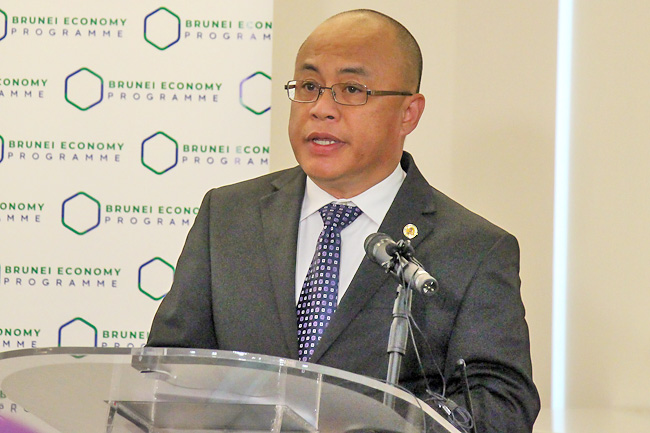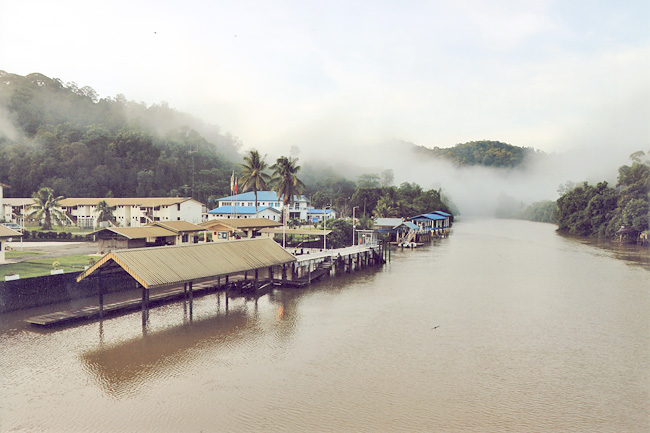Izah Azahari
The COVID-19 pandemic has severely disrupted global supply-chain activities. As forecast by the International Monetary Fund (IMF), global economy’s growth will contract from 6.1 per cent last year to 3.2 per cent this year and further reduce to 2.9 per cent in 2023.
This was shared by Minister of Primary Resources and Tourism Dato Seri Setia Dr Haji Abdul Manaf bin Haji Metussin (pic right) in his keynote address during the Sustainable Economy Forum at the RB Campus yesterday.
The minister shared that although restrictions have eased, rising inflation and continuous political conflict have further caused shocked and slowed global economic recovery.
“On the other hand, for Brunei Darussalam, the Department of Economic Planning and Statistics projected that our economy will bounce and GDP is expected to expand by 0.4 to 0.8 per cent across economic activities this year.”
In aspects of economic diversification and weaning off oil, the minister shared that the economic growth in Brunei still largely relies on the oil and gas sectors of which are highly subjected to uncertainty such as supply bottlenecks, oil market uncertainties, and unanticipated oil and gas supply disruptions.
While the government is making efforts to diversify the economy away from hydrocarbons, “the downstream petrochemical industry still has a paramount role in broadening Brunei Darussalam’s economic base and ensuring sustainability”, said the minister.


Dato Seri Setia Dr Haji Abdul Manaf said Brunei has expanded its product portfolio in the oil and gas downstream industries over the last decade, including the operation of a methanol plant by Brunei Methanol Company Sdn Bhd (BMC) since 2010; Pulau Muara Besar (PMB) Refinery and Petrochemical Plant operated by Hengyi Industries Sdn Bhd since 2019, and in 2021, the Brunei Fertilizer Industries (BFI) that started operation of a world-class and the largest high-quality fertiliser plants in Southeast-Asia with an annual production capacity of 1.365 million metric tonnes of urea.
“While we develop this sector, Brunei Darussalam has installed safeguards to ensure our environment is protected, by undertaking necessary measures to mitigate the risks and long-term impacts.”
FOOD SECURITY
The global food industry has shifted away from ‘just-in-time global supply chain and policies’ to favour “my nation first” strategies by encouraging companies to localise business operations and expand their capacity by relying on national and regional supply chains, said the minister.
He said as a small nation, the country must ensure food security and it is imperative for Brunei Darussalam to further develop its food sector by boosting its output and strengthening its local value chain so as to reduce its reliance on foreign imports.
“To sustainably increase local production means increasing its productivity through the adoption of technology and minimising opening up new areas,” said the minister.
He said several primary food producers or companies in the Sultanate have already started adopting automation, precision farming, better water management and the use of technology like drones for the effective application of fertilisers.
There is also the use of Internet of Things (IOTs) technologies for farm monitoring, automated crop production system and minimising environmental impacts, he said, adding that the sector is also starting to embrace ‘circular economy’, transforming to become smarter and sustainably boost production.
CIRCULAR ECONOMY
The minister said there is an increasing number of players in the agriculture sector applying green initiatives in their business models or farm operations.
One example is CIC Environmental Services Sdn Bhd which focusses on converting waste from chicken farms into organic fertiliser.
The minister said there is an increasing global awareness on the vital role of the environment in all facets of economic development.
He said it is crucial that the tourism industry in Brunei Darussalam applies and adopts environmentally conscious practices, through the promotion of regenerative tourism. He said it is important to consider the environment in every activity.
“This includes preserving the forest, transition to low carbon energy, adoption of green technology and the shift to green or alternative energy in various economic sectors such as agriculture, energy, forestry and others.”
The minister also highlighted that small and medium enterprises are vital for economic sustainability.
“In providing sustainable solutions, we are taking a holistic and whole-of-nation approach by collaborating with other key agencies that are responsible for providing a healthy entrepreneurial ecosystem, such as Ministry of Finance and Economy, Ministry of Transport and Infocommunications, Brunei Economic Development Board (BEDB)and Darussalam Enterprise (DARe).”




